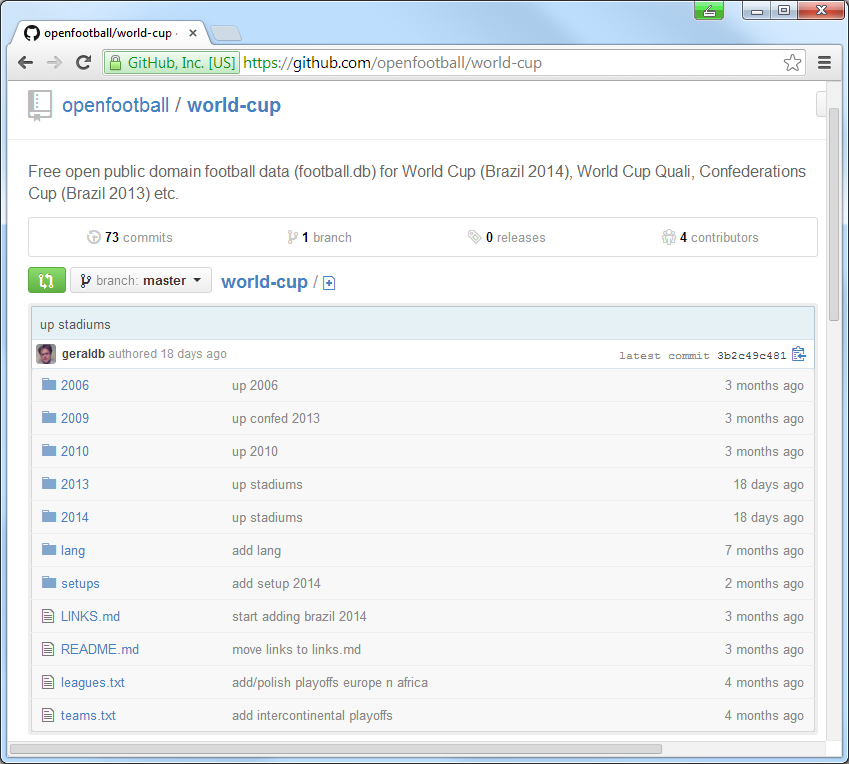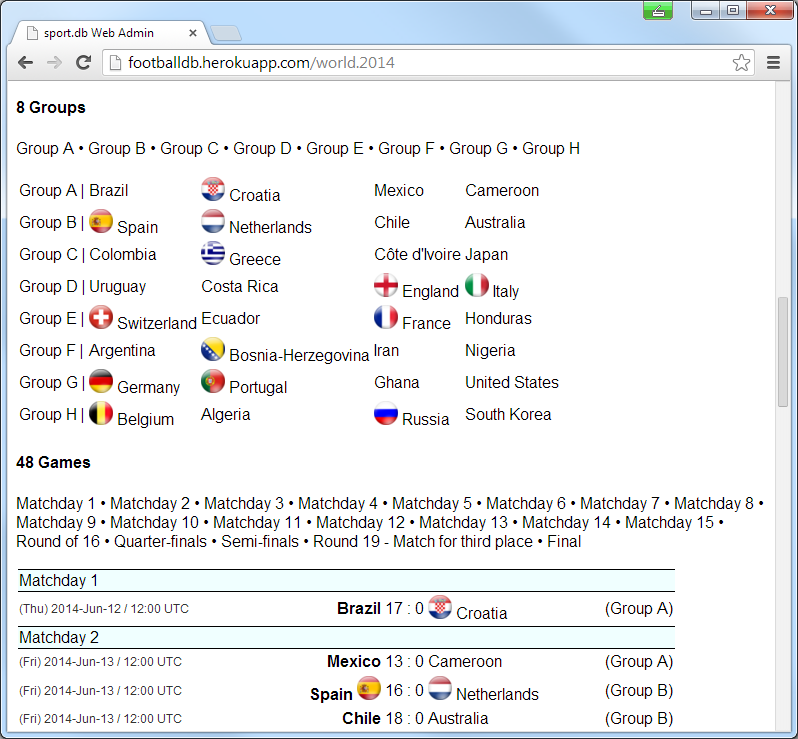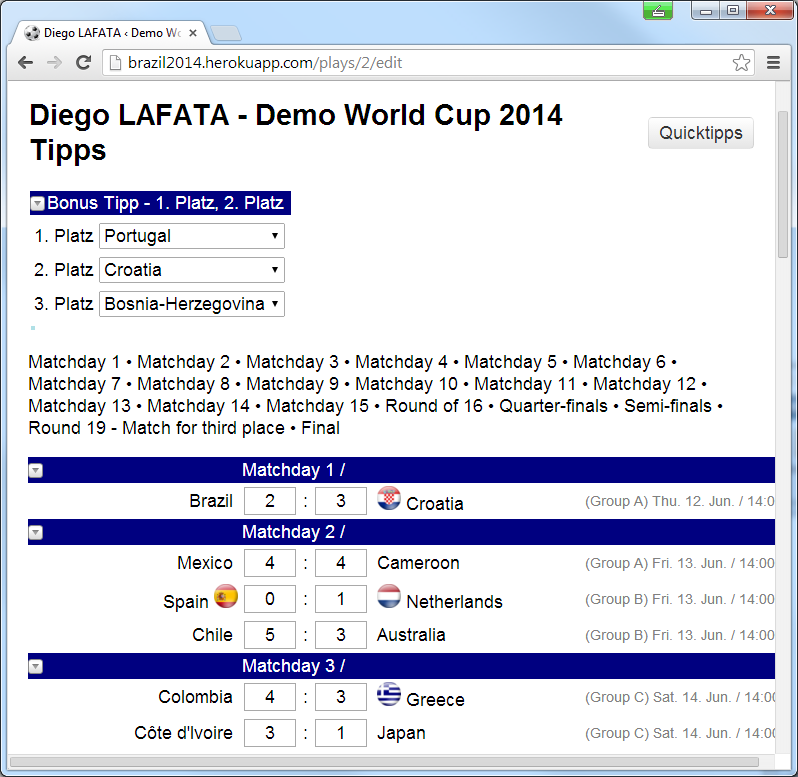Using Open Football Data - Get Ready for the World Cup in Brazil 2014 w/ Ruby
Agenda
- The State of Open Data - World Cup in Brazil 2014
- Do-It-Yourself – Let’s Build
football.db- Open Football Data - Do-It-Yourself – What Wiki Package to Use?
- Do-It-Yourself – What Source Format to Use?
- Ruby, Ruby, Ruby –
sportdbRuby Gem - How to use
football.dbin Ruby - Models - How to use
football.dbwith HTTP JSON(P) API - More Goodies - Examples Web Apps and Books
- Bonus: License – What is Public Domain? Why Public Domain?
- Bonus: Beer? Wine? Alpine Ski? Formula 1?
- Bonus: How to use HTTP JSON API -
GET /beer/guinness
World Cup in Brazil 2014 - The World’s Biggest (Sport) Event
When:
- 25 (match)days – 12 June - 13 July
Where:
- 12 cities – Rio de Janeiro, São Paulo, Brasília, Fortaleza, Belo Horizonte, Porto Alegre, Salvador, Recife, Cuiabá, Manaus, Natal, Curitiba
Teams:
- 32 teams – Australia, Iran, Japan, South Korea, Algeria, Cameroon, Ghana, Ivory Coast, Nigeria, Costa Rica, Honduras, Mexico, United States, Argentina, Brazil, Chile, Colombia, Ecuador, Uruguay, Belgium, Bosnia and Herzegovina, Croatia, England, France, Germany, Greece, Italy, Netherlands, Portugal, Russia, Spain, Switzerland
Matches:
- 64 matches – Groups stage (8x4): (Group A, Group B Group C, Group D, Group E, Group F, Group G Group H); Knockout stage: Round of 16, Quarter-finals, Semi-finals, Third place match, Final
The State of Open Data - World Cup in Brazil 2014
Q: Where can I get the teams, groups, match schedule (fixtures), players, stadiums lets say in CSV, JSON or SQL?
Q: Where can I download lets say world-cup-2014.db?
Let’s search (google):
Nothing. Nada. Nichts. Niente. Zilch. Zero.
The State of Open Data - World Cup in Brazil 2014 (Cont.)
Official FIFA Site (fifa.com/worldcup)
=> No open data. Offers a booklet¹ (PDF) for download for match schedule.
¹) Single page, really w/ six FIFA Partners, eight FIFA World Cup Sponsors and another six National Supporters.
Wikipedia (en.wikipedia.org/wiki/2014_FIFA_World_Cup)
Pro: Best source; open text license or public domain (license-free); everything available for download (page dumps, etc).
Cons: Mostly free-form text, that is, no structured data and no web service.
What now? Options
1) Screen scrap FIFA site with web crawler? Why not?
2) Try to convert free-form text from Wikipedia into structured data? Why not?
3) Do-It-Yourself: Build a Wikipedia for structured data? Why not?
Do-It-Yourself – Let’s Build football.db - Open Football Data
Q: What Wiki Package to Use?
MediaWiki? Semantic MediaWiki? MoinMoin? DokuWiki? PeanutButterWiki? Any Others?
Q: What Source Format to Use?
XML, JSON, YAML, SEXPS (S-Expressions), RDF Triplets, CSV (Comma-Separated Values), TOML (Tom’s Obvious, Minimal Language)? SQL? Any Others?
Do-It-Yourself – github.com/openfootball (Cont.)
Q: What Wiki Package to Use?
A: Git (and GitHub)
Why Git?
- Distributed is the new centralized (everything is local, any workflow, many backups, and so on)
- Free and open source; small and fast version tracker
Learn more @ git-scm.com
Why GitHub?
- Build
softwaredata better, together.
Learn more @ github.com

Do-It-Yourself – What is CSV (Comma-Separated Values)?
Q: What Source Format to Use?
A: Keep it as simple as possible. Hand-crafted not machine-generated source. Easy-to-read and easy-to-write.
XML, JSON, YAML, SEXPS (S-Expressions),
RDF Triplets, SQL,
TOML (Tom’s Obvious, Minimal Language),
CSV (Comma-Separated Values)
teams.csv:
gre, Greece, GRE, gr
ned, Netherlands, NED, nl
ger, Germany, GER, de
por, Portugal, POR, pt
esp, Spain, ESP, es
ita, Italy, ITA, it
cro, Croatia, CRO, hr
eng, England, ENG, en
...
Do-It-Yourself — What’s missing in CSV? What’s CSV v2?
What’s missing?
- No comments
- No blank lines
- No multi-line records
- No data types (or text patterns or field markers)
- No unordered fields (that is, fields depend on position) or variable number of fields per record
- No default/inherited values
- And much more
Let’s fix it. Welcome CSV v2 (github.com/csv2).
south-america/br-brazil--stadiums.txt:
### Stadiums
[maracana]
Maracanã|Estádio do Maracanã, 1950
76_935
Rio de Janeiro, RJ
en.wikipedia: Estádio_do_Maracanã
[corinthians]
Corinthians|Arena Corinthians|Arena de São Paulo, 2014
68_000
São Paulo, SP
en.wikipedia: Arena_Corinthians
...
Do-It-Yourself – Mini Language for Football Fixtures
DSL - Domain-Specific Language
##################################
# World Cup 2014 Brazil
# -- Groups
Group A | Brazil Croatia Mexico Cameroon
Group B | Spain Netherlands Chile Australia
Group C | Colombia Greece Côte d'Ivoire Japan
Group D | Uruguay Costa Rica England Italy
Group E | Switzerland Ecuador France Honduras
Group F | Argentina Bosnia-Herzegovina Iran Nigeria
Group G | Germany Portugal Ghana United States
Group H | Belgium Algeria Russia South Korea
# -- Group A
Matchday 1 / Group A
(1) Thu Jun/12 17:00 Brazil - Croatia @ Arena de São Paulo, São Paulo (UTC-3)
Matchday 2 / Group A
(2) Fri Jun/13 13:00 Mexico - Cameroon @ Estádio das Dunas, Natal (UTC-3)
Ruby, Ruby, Ruby – sportdb Ruby Gem
Import any fixtures:
- “Classic” Comma-separated values
- “Modern” Comma-separated values v2
- Mini language for football
into any SQL database. Example:
Step 1: Get a copy of the data
$ git clone git://github.com/openmundi/world.db.git
$ git clone git://github.com/openfootball/world-cup.git
Step 2: Let’s build the world-cup-2014.db
$ sportdb --dbname world-cup-2014.db setup --include ./world-cup --worldinclude ./world.db
That’s it.
How to use football.db in Ruby - Models
Event Model
ev = Event.find_by( key: 'world.2014' )
ev.title
=> 'World Cup 2014'
ev.teams.count
=> 32
ev.games.count
=> 64
ev.rounds.count
=> 20
ev.groups.count
=> 8
ev.stadiums.count
=> 12
How to use football.db in Ruby - Models (Cont.)
Team Model
bra = Team.find_by( key: 'bra' )
bra.title
=> 'Brazil'
bra.country.continent.title
=> 'South America'
bra.games.count
=> 3
How to use football.db in Ruby - Models (Cont.)
Game Model
g = Game.find_by( pos: 1 )
g.team1.title
=> 'Brazil'
g.team2.title
=> 'Croatia'
f.group.title
=> 'Group A'
f.round.title
=> 'Matchday 1'
f.stadium.title
=> 'Arena de São Paulo'
f.stadium.city.title
=> 'São Paulo'
How to use football.db in Ruby - Models (Cont.)
More Models
- Round (e.g. Matchday 1, Round of 16, Final, etc.)
- Group (e.g. Group A, Group B, etc.)
- League (e.g. World Cup, World Cup Quali, World Confed, etc.)
- Season (e.g. 2014, 2018, etc.)
- Person a.k.a. Player (e.g. Lionel Messi, Neymar Jr, etc.)
- Roster a.k.a. Team Squad (e.g. ARG-9 Lionel Messi, BRA-11 Neymar Jr, etc.)
- Ground a.k.a. Stadium (e.g. Estádio do Maracanã)
- And some more
How to use football.db with HTTP JSON(P) API
$ sportdb serve
Use the football.db HTTP JSON(P) API - Examples
List all teams for an event (league+season) /event/:key/teams
-
/event/world.2014/teamsWorld Cup 2014 -
/event/de.2013_14/teamsDeutsche Bundesliga 2013/14
List all rounds for an event (league+season) /event/:key/rounds
-
/event/world.2014/roundsWorld Cup 2014 -
/event/de.2013_14/roundsDeutsche Bundesliga 2013/14
List all games in a round for an event (league+season) /event/:key/round/:pos
-
/event/world.2014/round/20World Cup 2014 - 20th Round (=> Final) -
/event/de.2013_14/round/5Deutsche Bundesliga 2013/14 - 5th Round
How to use HTTP JSON API - GET /event/world.2014/teams
List all teams for an event /event/:key/teams
GET /event/world.2014/teams
{
"event": {
"key": "world.2014",
"title": "World Cup 2014"
},
"teams": [
{ "key": "gre", "title": "Greece", "code": "GRE" },
{ "key": "rus", "title": "Russia", "code": "RUS" },
{ "key": "ned", "title": "Netherlands", "code": "NED" },
{ "key": "ger", "title": "Germany", "code": "GER" },
{ "key": "por", "title": "Portugal","code": "POR" },
...
]
}
How to use HTTP JSON API (Cont.) - GET /event/world.2014/round/1
List all games in a round for an event /event/:key/round/:pos
GET /event/world.2014/round/1
{
"event": { "key": "world.2014", "title": "World Cup 2014" },
"round": { "pos": 1, "title": "Matchday 1" },
"games": [
{
"team1_key": "bra",
"team1_title": "Brazil",
"team1_code": "BRA",
"team2_key": "cro",
"team2_title": "Croatia",
"team2_code": "CRO",
"play_at": "2014/06/12",
"score1": null,
"score2": null,
"score1ot": null,
"score2ot": null,
"score1p": null,
"score2p": null
}
]
}
More Goodies - Examples Web Apps and Books
Any Example Web Apps?
sport.db.admim- Open Source Rails Engine; seegithub.com/geraldb/sport.db.admin

More Goodies - Examples Web Apps and Books (Cont.)
Any Example Web Apps?
- Sportbook - Football Betting (Prediction, Picks) Pool Manager; Open Source Rails Web App; see
github.com/openbookie

More Goodies - Examples Web Apps and Books (Cont.)
Any Example Web Apps?
football.js- Open Source JavaScript Matchday Widget - still early stage; seegithub.com/geraldb/football.js- The Free World Football Almanac - Free public domain e-book - still early stage; see
github.com/openfootball/book
Anything Else?
- Your App Here; Be Bold
That’s it. Thank you.
Links
More Open Data Projects
Questions? Comments?
Bonus: License – What is Public Domain? Why Public Domain?
License
The football.db schema, data and scripts are dedicated to the public domain.
Use it as you please with no restrictions whatsoever.
What?
No Copyright. No License. Creative Commons Zero (CC0). Unlicense.
Why?
Keep it simple.
Bonus: Beer? Wine? Alpine Ski? Formula 1?
What’s beer.db?
A free open public domain beer database n schema for use in any (programming) language (e.g. uses plain text fixtures/data sets). Example:
### Brewery
guinness, St. James's Gate Brewery / Guinness Brewery, 1759, Dublin
### Beer
Guinness|Guinness Draught, 4.2%, irish_dry_stout|dry_stout|stout
Bonus: How to use HTTP JSON API - GET /beer/guinness
Get beer by key /beer/:key
GET /beer/guinness
{
"beer":
{
"key":"guinness",
"title":"Guinness",
"synonyms": "Guinness Draught",
"abv":"4.2",
"srm":null,
"og":null,
"tags":["irish_dry_stout","dry_stout","stout"],
"brewery":
{
"key": "guinness",
"title": "St. James's Gate Brewery / Guinness Brewery"
},
"country":
{
"key":"ie",
"title":"Irland"
}
}
}